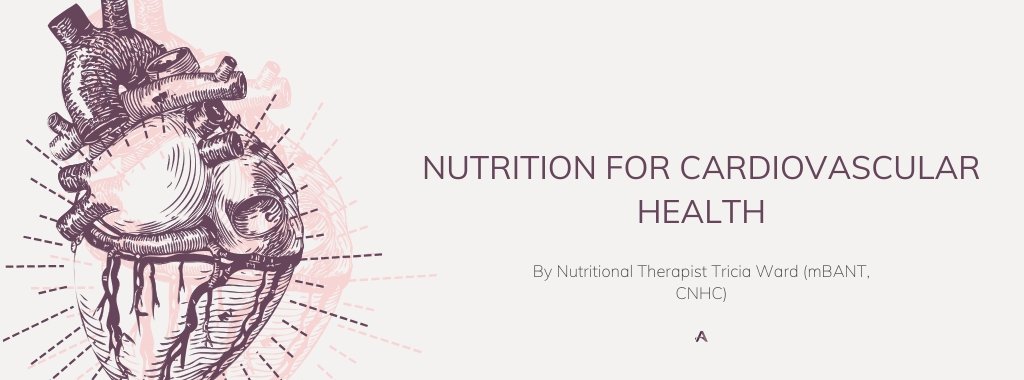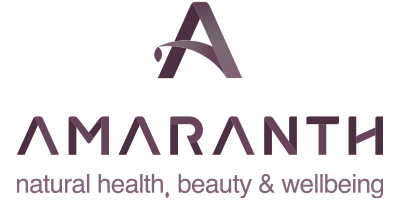Nutrition for Cardiovascular Health

Cardiovascular disease is responsible for 31% of deaths globally(1) and more than 7 million people in the UK live with circulatory diseases(2) including, amongst others, coronary heart disease, heart failure and strokes. Cardiovascular issues may arise due to genetics, but they most commonly result from poor diet and lifestyle choices over a long period (typically decades), such that the system becomes inefficient and ineffective.
High sugar diets, processed foods, a sedentary lifestyle and stress all contribute to the risk of raised blood pressure, elevated cholesterol levels and the ‘furring’ of the arteries (atherosclerosis), known factors that increase the risk of heart disease.
Like many diseases, heart disease is thought of as an inflammatory condition - it’s a little like an iron gate (our blood vessels) rusting in oxygen and water (oxidation) and becoming less efficient and more brittle if we don’t look after it properly.
Heart health relies on an overall and individualised approach and there’s lots that we can do with lifestyle modifications, food choices and supplements to support a healthy cardiovascular system. Little steps can really accumulate to make notable differences.
So, how do we help to love our hearts?
Fats are essential, in the right form
Essential for hormones and cell walls, amongst other things, our liver produces as much cholesterol as our body needs. However, with the foods we typically eat and the changes that may result in the body from smoking, alcohol and stress, the body can end up with the wrong balance of cholesterol, and other fats, and in the wrong places.
So called ‘good’ cholesterol relates to the ’HDL' transport vehicle that carries cholesterol away from the blood vessels and tissues and to our liver for break-down or storage, whilst 'bad' cholesterol relates to the small transport ‘LDL’ molecules that carry and potentially leave cholesterol in the blood vessels, contributing the furring effect we mentioned earlier.
This furring lowers the flexibility of the arteries and the volume of blood that they can carry, making the heart work harder to pump the blood through the vessels and with less being supplied to the organs and tissues.
People often remain afraid of fats, especially when they are trying to lose weight. However, it is about the type and amount of fats that we need for our health.
To support this, we should:
Eat A Rainbow
Fruit and veg, herbs and spices offer a wide range of protective plant compounds. Each colour offers different benefits. When it comes to cardiovascular health, the blue, red and purple fruits and veg, berries and pomegranate in particular, have compounds in them that are strong anti-oxidants, helping to protect the blood vessels from damage and reducing blood pressure - they’re low in sugar too so I don’t feel guilty tucking in to a bowl of steaming porridge topped with fresh or frozen mixed berries and a sprinkle of cinnamon on these winter mornings.
The vibrant yellow spice, turmeric, and one of its active ingredients, curcumin, have been shown in studies, and we have seen first-hand in-store, to have strong anti-inflammatory effects, being shown to help reduce blood pressure and even halt the oxidation (the “rusting") of cholesterol in and retain the overall health of the blood vessels (5,6,7). We’ve also seen first-hand how curcumin can relieve joint pain. Apart from a soothing turmeric-based, ‘golden milk’ it can be difficult to get enough turmeric in to make a real difference…at least without turning all your crockery yellow(!), but it’s more convenient and usually more potent in supplement form. We particularly like Viridian’s Curcumin Co-Q10 and Pukka’s wholistic turmeric.
Plants, legumes, nuts and seeds are also rich in phyto-sterols - plant versions of the
cholesterol we create ourselves. By competing with the cholesterol in our body, they lower the amount of cholesterol that remains in our body, particularly when the fibre from the plants and nuts help to sweep the cholesterol out of the body. To get a concentrated source of these plant sterols, though without the fibre, we rely on Allicin’s Lesterol.
Give yourself a break
We all have multiple demands on our time, seemingly all of the time. However, ongoing stress, physical or mental, may result in extra cholesterol production or negative changes to the way in which our body handles fats and sugars more generally. Try to take some time for yourself every day - start with 5 minutes….walk, sing, listen to the birds, read a poem, laugh, focus on your breathing, and build up your ‘me-time’. Try to incorporate activity on a daily basis.
Magnesium is our go-to to help calm the nervous system, but it has a multitude of roles in the body, also contributing to both decrease blood pressure, aid muscle contraction and relaxation (remember the heart is a muscle) and improving sleep (11,12). You can spray it on and massage it in to your feet or body or take a capsule. Viridian’s Magnesium Taurate is highly absorbable and supportive to the health of the blood vessels too whilst Better You’s Magnesium Sleep spray is a convenient, effective way for a few minutes of self-massage and to get your magnesium in before going to sleep.
Keep it simple
Wherever possible, try to consume whole, unprocessed foods. This means you should be able to recognise every ingredient - a piece of fish or chicken, broccoli, carrots, ginger, lentils, herbs, nuts and seeds, as then you know what’s going in to your body. This should also help with weight management - as you’re no longer subject to those hidden fats and sugars that lurk in processed foods. Dark chocolate (70% + cocoa) also fits (eaten in small amounts!) in to the list of foods that have beneficial flavonoids, a type of antioxidant that help to reduce blood pressure.
A simple way to support your cardiovascular health is with Viridian’s Cardio Multi, a multi-vitamin packed with nutrients that have been specifically researched and shown to support cardiovascular health, or BioCare’s Methyl B complex, which includes the spectrum of B vitamins that are also important for the health of your heart and blood vessels, helping to both break-down fats and specific by-products in the body which can otherwise exacerbate cardiovascular risk.
Nobody is perfect - or at least not on a long-term basis (and chocolate is my personal weakness!), but we can skew the balance in our favour by making realistic changes on an ongoing basis to support and help to prevent heart health issues.
Come in and have a chat with us…over a cup of Pukka’s Love teaAt Amaranth we have a team of registered Nutritional Therapists who are available for one to one consultations and who are also available to offer shop floor advice. Call 0161 439 9856 for more information.
The information contained in this article is not designed to diagnose or treat any health conditions. Supplements and dietary changes should only be made with the advice of your healthcare professional. It is essential that you inform your healthcare provider of any medications you are taking before starting to take any supplements as they may have serious interactions. Do not take any of the supplements mentioned in this article if you are taking warfarin or any blood thinning medications, always ask for advice.
1. WHO, 2018.
2. BHF, 2018; ONS/NISRA/NRS, 2017
3. https://www.ncbi.nlm.nih.gov/m/pubmed/12442909/
4. https://nutritionj.biomedcentral.com/ar)cles/10.1186/1475-2891-12-142
5. Wanwarang Wongcharoen, Arintaya Phrommintikul, The protec)ve role of curcumin in cardiovascular diseases, International Journal of Cardiology, Volume 133, Issue 2, 2009, Pages 145-151;
6. Nobuhiko Akazawa, Youngju Choi, Asako Miyaki, Yoko Tanabe, Jun Sugawara, Ryuichi Ajisaka, Seiji Maeda, 2012, Curcumin ingestion and exercise training improve vascular endothelial function in postmenopausal women, Nutrition Research, 32(10):795-799.
7. Oliver, J.M. et al, (2016), Novel Form of Curcumin Improves Endothelial Function in Young, Healthy Individuals: A Double-Blind Placebo Controlled Study, Journal of Nutrition and Metabolism; Article ID 1089653]
8. Salmoirago-Blotcher E et aI. Constipation and risk of cardiovascular dis-ease amongst menopausal women. Am J Med. 2011;124(8):714-23.
9. Svistunov AA et al. [Chronic constipation in the practice of a therapist: Features of therapy for comorbidity]. Ter Arkh. 2017;89(4):69-74.
10. Threapleton DE et al. Dietary fibre intake and risk of cardiovascular disease: systematic review and metaanalysis. BMJ 2013;347:f6879 418 Zhou S, Zhang, Z, Gelin, X. Notable].
11. [Schreckenberg, R. Schluter, KD. (2018). Calcium sensing receptor expression and signalling in cardiovascular physiology and disease. Vascular Pharmacology. 107 (1), 35-42.
12. McCarty M. (1996). Complementary vascular- protective actions of magnesium and taurine: a rationale for magnesium taurate. Journal of Medical Hypothesis. 46 (2), 89-100],
13. Yang et al. Efficacy of folic acid supplementation in cardiovascular disease prevention: an updated meta-analysis of randomized controlled trials. Eur J Intern Med 2012; 23 (8): 745-54.
14. Sato et al. Effect of folate and mecobalamin on hip fractures in patients with stroke. JAMA. 2005; 293 (9): 1082-8. 496 Lee
